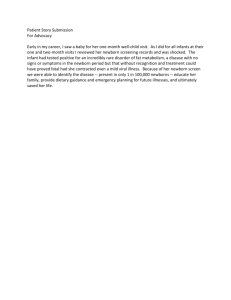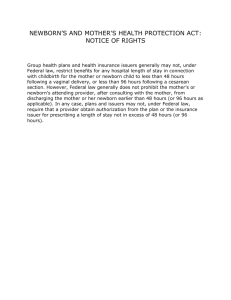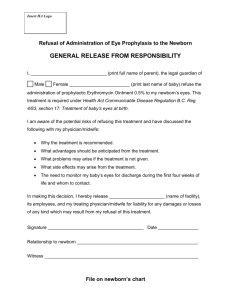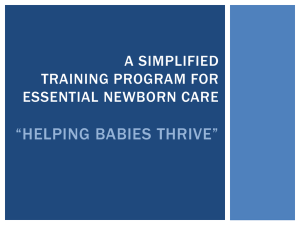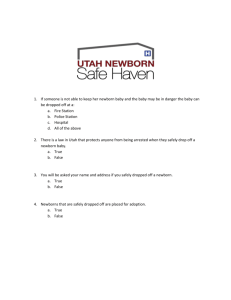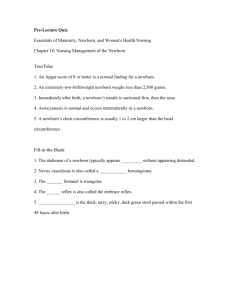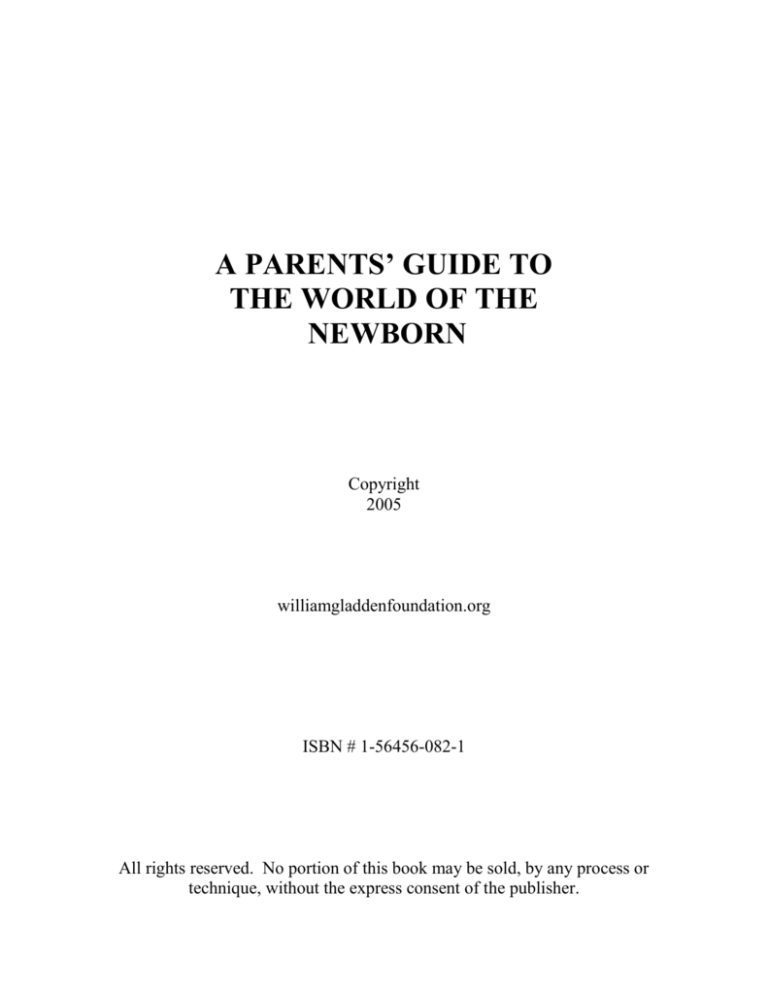
A PARENTS’ GUIDE TO
THE WORLD OF THE
NEWBORN
Copyright
2005
williamgladdenfoundation.org
ISBN # 1-56456-082-1
All rights reserved. No portion of this book may be sold, by any process or
technique, without the express consent of the publisher.
INTRODUCTION
When asked where he was born, Groucho Marx once replied, “New York City…I wanted
to be near my mother.” While that remark has received guffaws over the years, it is
rapidly becoming less of a laughing matter. Due to a number of books, newspaper and
magazine articles, films and television programs about the amazing mental and emotional
capacities of unborn and newborn infants, many modern parents are being sent into a
tizzy regarding what their soon-to-arrive offspring can see, hear, feel, understand, think
and do. Quite often, the joy and wonder of mothers and fathers getting to know their
babies as their babies get to know them is degenerating into anxiety and guilt concerning
what the babies may already know and what the parents should have known.
The problem is that although there has been a considerable amount of research done on
newborn babies during the past few decades, much of it has been misrepresented to the
public. The popular media has a tendency to focus on groundbreaking studies that
produce new and dramatic discoveries, routinely ignoring the subsequent follow-up
studies that frequently show initial findings to be false or highly questionable at best.
Consequently, parents are likely to receive a seriously distorted, even erroneous, picture
of the newborn’s experience.
The fact is that despite the impression modern parents may be receiving, the interests and
abilities of a newborn baby are uncomplicated, and the early developmental process is
forgiving. Furthermore, at least for the first several weeks, simply by doing what comes
naturally, most mothers and fathers will satisfy their baby’s important needs, helping him
achieve a superb start in life.
Of course, most parents would appreciate reliable information nonetheless. Unlike
automobiles and microwave ovens, newborn babies do not come with owner’s manuals
or instructions. Mothers and fathers certainly would feel better if they could be
reasonably confident that they were avoiding major mistakes and handling matters in the
most beneficial manner.
-II-
Therefore, some sensible guidance regarding the world of the newborn is in order. Such
information would enable parents to decrease their fussing and fretting, and to increase
their fascination and fun, all the while ensuring that their baby’s debut is a success.
However, although all newborns share a few fundamental characteristics and various
parenting principles apply universally, they should keep in mind that every baby is
unique in many ways, allowing room for mothers and fathers to express their own
individuality as well.
Michael K. Meyerhoff, Ed.D.
William Gladden Foundation
-III-
QUESTIONS AND ANSWERS
How Can Parents Ensure That Their Baby Will Have
The Best Possible Introduction To The World?.............................................................5
Can Parental Behavior Affect A Baby Even Before His Birth?..........................................5
Is It True That A Baby Can Sense His Mother’s
Thoughts And Feelings Prior To Birth?..........................................................................5
Is The Birth Process A Stressful Experience For The Baby?..............................................5
Should Parents Insist On Natural Childbirth?......................................................................6
Would It Be Wise To Play It Safe And Avoid
Even A Remote Possibility Of Trauma During Birth?...................................................6
When Does Emotional Bonding Take Place?......................................................................6
How Important Is The Father’s Presence During Birth?.....................................................6
Why Might A Newborn Appear Physically Unattractive?.....................………….............7
What Else Should Parents Know About Their Newborn’s Body?......................................7
Are A Child’s Senses Fully Functional At Birth?...............................................................7
What Are The Limitations On A Newborn’s Vision?.........................................................7
Is The Newborn Aware Of What Is Happening Around Him?................………………...8
How Much Of His Experience Will The Newborn Remember?.........................................8
Is It True That A Baby Is Capable Of Imitating Parental
Behavior Immediately After Birth?................................................................................8
Doesn’t Imitative Behavior Indicate At Least
Some Mental Sophistication In The Newborn?......................…………........................8
Does A Newborn Need Stimulation?...................................................................................9
How Can Parents Tell When Their Newborn Needs Something?.......................................9
Won’t Parents Spoil Their Newborn By
Responding Promptly To His Cries Every Time?..........................................................9
When Should Parents Starting Doing More For Their Newborn?......................................9
THE NATURE OF THE NEWBORN………………………………………………...10
PARENTAL CONCERNS REGARDING THE
EXPERIENCE OF A NEWBORN…………………….……………..…………….12
BASIC EQUIPMENT FOR WELCOMING A NEWBORN………………....…......14
TIPS FOR COMOFRTING A COLICKY NEWBORN……………………………..15
SOURCES OF HELP AND INFORMATION…….………………………………….16
-IV-
HOW CAN PARENTS ENSURE THAT THEIR NEWBORN WILL HAVE THE
BEST POSSIBLE INTRODUCTION TO THE WORLD?
Parents’ activities should represent three key elements: COMFORT, CONFIDENCE
and the CAPACITY to provide loving care. To be properly relaxed and ready, parents
require a clear idea of what is going on and what they have to do. Fortunately, competent
medical professionals usually do an effective job of supplying parents with information.
The problem is that many parents find themselves plagued by fears and doubts resulting
from misinformation. While small doses of such emotions are inevitable, large amounts
are unnecessary and distracting. Therefore, the foremost task for parents is to free
themselves from extraneous concerns so they can focus and function effectively.
CAN PARENTAL BEHAVIOR AFFECT A BABY EVEN BEFORE HE IS BORN?
Research shows that at least during the last few weeks of pregnancy, the fetus is sensitive
to light, sound and motion. Of special note is that a newborn sometimes displays a
“familiarity” response to voice patterns he senses while in the womb. Some people take
this to mean that what the parents say and do prior to their child’s birth have a significant
and lasting effect. However, there is no evidence that the fetus senses anything specific
or processes it in a meaningful way. There certainly is no reason to suppose that what
parents say and do prior to birth is as important as what they say and do afterward.
IS IT TRUE THAT A BABY CAN SENSE HIS MOTHER’S THOUGHTS AND
FEELINGS PRIOR TO BIRTH?
Chemical substances in the mother’s bloodstream pass along to the fetus almost from
conception on. Therefore, pregnant women should be careful about what they eat, drink
and do to themselves. Some people claim the mother’s thoughts and feelings transmit to
the fetus, too, and they warn pregnant women to be as cautious about their mental and
emotional state as they are about their physical state. However, there is no compelling
evidence to support this notion. While avoiding chronic or excessive stress is certainly a
good idea, an expectant mother should not worry about occasional bouts of anger, fear,
doubt and melancholy having the same effects on the fetus as alcohol, tobacco or cocaine.
IS THE BIRTH PROCESS A STRESSFUL EXPERIENCE FOR THE BABY?
From an adult’s perspective, the transition from womb to world certainly can seem
traumatic. Being squeezed from a gentle, warm, quiet, dark, liquid environment into one
containing bright lights, cold air, loud voices and perhaps a swat on the behind does not
sound pleasant. Consequently, many people have advocated procedures (from giving
birth underwater to muffling all lights and sounds in the delivery room) designed to make
the process as minimally stressful as possible for the child. However, once again, there is
no evidence that the newborn experiences a genuine sense of unpleasantness or is really
suffering in any way.
-5-
SHOULD PARENTS INSIST ON NATURAL CHILDBIRTH?
Each couple must make this decision in consultation with their obstetrician. In general,
natural childbirth is highly recommended, as it avoids exposing the baby to potentially
harmful drugs and allows the mother to be fully involved in welcoming her newborn.
However, if circumstances require special medical intervention (from the administration
of anesthetics to the performance of caesarean section), parents should not feel they and
their child is losing something for which it will be impossible to compensate later on.
WOULD IT BE WISE TO PLAY IT SAFE AND AVOID EVEN THE REMOTE
POSSIBILITY OF TRAUMA DURING CHILDBIRTH?
Even the most prudent planning cannot ensure that “birthing” will proceed perfectly.
Moreover, the health and comfort of the mother should not be put at risk just to eliminate
a minor and possibly imagined risk to the child. Unless there are severe complications
that cause serious physical damage to the infant, there is no reason to believe that the
events and conditions surrounding the delivery will have any significant, lasting effect on
him. Furthermore, parents must remember that a newborn’s introduction to the world
consists of many facets and covers a substantial time; they should avoid placing an
inappropriate emphasis on any one part to the potential detriment of others.
WHEN DOES EMOTIONAL BONDING TAKE PLACE?
Researchers once suggested that there was a “critical period” for the development of the
parent/child relationship. They claimed that when mothers and their newborns had skinto-skin contact during the few hours following birth, a special bonding took place.
However, new evidence proves that the formation of a strong emotional bond between
parents and child is actually a long and complicated affair covering many months.
Therefore, while early, close contact may contribute to the overall process, parents who
have their premature infant placed in an incubator, who require a caesarean section or
who for any other reason cannot maintain contact should not feel they have missed a
major opportunity to ensure the highest quality parent/child relationship.
HOW IMPORTANT IS THE FATHER’S PRESENCE DURING BIRTH?
Especially if it is a natural childbirth and the father is the “coach,” his presence will
provide comfort, support and encouragement for the mother. Furthermore, since he is not
physically involved in the same way as the mother, being present at the birth affords the
father a chance to get psychologically involved in his child’s delivery. Nonetheless, his
presence or absence will not necessarily have a significant impact on the newborn. While
it is certainly recommended that he be as much a part of the process as possible, if
unavoidable factors prevent him from attending the birth, the father should not feel he has
missed a singular opportunity to establish the best relationship with his baby.
-6-
WHY MIGHT A NEWBORN APPEAR PHYSICALLY UNATTRACTIVE?
Whenever Hollywood wants to show a newborn baby on the movie screen, they usually
use an infant who is about three-months-old. In reality, a normal newborn is not nearly
as cute as his parents might expect. As he squeezes through the birth canal, the bones of
his head push together, giving his head an elongated look. Moreover, to allow for some
additional growth, his skull has one large and several small soft spots (called “fontanels”)
that will gradually close and harden over the next 18 to 24 months. His ears and nose
may have been “squished” a little, and he is likely to have bloodshot eyes. He may not
have hair on his head, but it also is possible that his entire body will be covered with a
layer of fine, silky hair (called “lanugo”), and he probably will be covered all over by a
white, cheesy substance (called “vernix”).
WHAT ELSE SHOULD PARENTS KNOW ABOUT THEIR NEWBORN’S
BODY?
Because of hormones from his mother’s bloodstream and the pressure of the birth
process, the newborn’s joints may appear floppy and his limbs may be somewhat
misshapen. Due to other residual hormones and the slight immaturity of his body’s
circulation and purification systems, the newborn’s skin may be alternately grayish,
jaundiced (yellow) or blotchy red and purple; and the genital may be swollen. The slight
immaturity of his nervous system causes his hands to fist tightly; most of his movements
will be sudden and jerky, exhibiting a spontaneous body spasm or startle on occasion.
These conditions may alarm unprepared parents, but they are all temporary.
ARE A BABY’S SENSES FULLY FUNCTIONAL AT BIRTH?
As best as can be determined, the senses of taste, smell, touch and hearing are in
complete working order at birth (in fact, a little prior to birth). The only problem is that
all of these senses seem to be very sensitive in the beginning, and they remain so for
several weeks. Therefore, to provide a newborn with a comfortable introduction to the
world, keep all input as gentle as possible. Mother’s milk or bland formula, soft clothing
and reasonably quiet surroundings are recommended. Vision also is functional at birth,
but there are significant limitations on what a newborn can see.
WHAT ARE THE LIMITATIONS OF A NEWBORN’S VISION?
Although he is not blind, a newborn’s vision is fuzzy; he is much more amenable to bold
colors and high contrasts than to subtle shades and delicate designs. Moreover, since his
eyes do not converge smoothly, he has difficulty focusing (he also may appear cross-eyed
on occasion). Within two to three months, his eyes will begin to work well together –
turning toward each other to fix on close objects and moving apart to fix on distant
objects. For the first few weeks, the baby will be able to see something clearly, only if it
is approximately eight to twelve inches in front of his face.
-7-
IS THE NEWBORN AWARE OF WHAT IS HAPPENING AROUND HIM?
According to the most reliable research on the development of the human mind, a baby is
born with practically no ability to think. Although he is receiving input through his
senses, his mind is not capable of processing information in a manner that in any way
resembles adult mental functioning. Furthermore, he has absolutely no frame of
reference for anything, having no knowledge to draw upon. He has no concept of time
and space, and he is unfamiliar with his own hands and feet, much less his mother and
father. Therefore, the newborn may be technically aware of what is happening around
him, but he certainly lacks the capacity to understand or appreciate it.
HOW MUCH OF HIS EXPERIENCE WILL THE NEWBORN REMEMBER?
Some people claim that a newborn will remember everything, and that he will be able to
recall specific memories of his earliest days later in life. However, reliable research
indicates that the capacity to form even brief mental images does not develop until many
months later; the capacity to store and retrieve images routinely and reliably does not
evolve until the middle to the end of the second year. Therefore, while regular, sustained
circumstances may eventually create some generalized impact on a deep level, an
individual event or momentary condition will not leave distinct marks on the newborn’s
mind.
IS IT TRUE THAT A BABY IS CAPABLE OF IMITATING PARENTAL
BEHAVIOR IMMEDIATELY AFTER BIRTH?
This is another case of insufficient research. A while back, researchers showed that
contrary to the long-standing evidence indicating that babies do not start imitating until
late in the first year, newborns could imitate an adult sticking out his tongue. However,
further studies found that the tongue-protrusion behavior was the only thing that
newborns could imitate: only some newborns could do it and only under special
conditions. More importantly, although this capacity was present at two days of age, it
was not present at two weeks or two months of age; indeed, it did not surface again until
late in the first year.
DOESN’T IMITATING BEHAVIOR INDICATE AT LEAST SOME MENTAL
SOPHISTICATION IN THE NEWBORN?
With an immature, unstable nervous system, a newborn is likely to exhibit several quirky,
bizarre, reflex-like patterns that disappear after a few days and have little significance.
For example, if a parent holds a newborn upright over a table or floor and his feet lightly
touch the surface, his legs will move up and down in what is called the “walking reflex.”
This disappears shortly, and the baby does not start true walking until a year or so later.
Thus, just as no one would state that a newborn can walk, an assertion that a newborn is
actually mimicking his parents or engaging in any kind of intentional, purposeful activity
is erroneous.
-8-
DOES A BABY NEED STIMULATION?
A baby requires no special stimulation in the beginning. The first few weeks are strictly
an adjustment and acclimation period during which the infant is capable of doing little.
He sleeps as many as 20 hours each day. When awake, he is interested only in his own
physical well-being. He usually does not sleep for more than a few hours at a stretch and
in between, he needs cuddling, feeding and attending quite often. Instead of worrying
about giving their newborn unnecessary stimulation, parents should be prepared to
receive and enjoy more stimulation from their newborn than they might have imagined.
HOW CAN PARENTS TELL WHEN THEIR NEWBORN NEEDS SOMETHING?
A newborn cries when he experiences discomfort. While this helps to determine when he
needs something, knowing exactly what he needs is not easy. Sometimes his distress is
obvious – a dirty diaper or a cold draft. On occasion, though, the source of his difficulty
may be a mystery, and parents may have to pursue a trial-and-error strategy to find the
solution. The important thing is to respond to the infant’s cries with prompt, nurturing
services. Even if his problem is not resolved immediately every time, he will sense each
episode of attention and affection on a fundamental level, and he will develop a strong,
general sense that the world is a secure place because he is cared for and loved.
WON’T PARENTS SPOIL THEIR NEWBORN BY RESPONDING PROMPTLY
TO HIS CRIES EVERY TIME?
Some people believe that parents who provide prompt nurturing every time their newborn
cries are allowing the child to manipulate. They recommend placing the infant on a
schedule, giving care at specific times. Most child development specialists disagree with
this strategy, for spoiling a baby at this point is impossible. The newborn’s cry is strictly
a reflexive response to physical distress. He has no social awareness, no capacity for
intentional behavior, no recognition of personal power or anything else that would be
necessary for spoiling to take place. Ignoring his cries may limit his ability to develop
fundamental trust that will support all healthy interpersonal relationships in the future.
WHEN SHOULD PARENTS START DOING MORE FOR THEIR NEWBORN?
Although the birth process need not be unpleasant, it can be exhausting, and while caring
for the newborn is not complicated, it can be demanding. Parents should simplify their
existence and concentrate on supplying their baby with the basic nurturing necessary to
establish the fundamental bond of love and trust between parents and child. A month or
so will pass before the infant begins to be more awake and alert. Another month or two
will go by before he starts to develop social awareness, good vision, rudimentary mental
capacities and other abilities that may call for sophisticated input from mother and father.
By that time, he will be more settled and regular, so parents will be in better shape to
pursue other activities.
-9-
THE NATURE OF THE NEWBORN
To understand and appreciate the world of the newborn, parents need to have a clear
picture of his essential characteristics. Since they probably will provide him an excellent
introduction to life simply by doing what comes naturally, knowledgeable guidance will
allow parents to feel comfortable, confident and competent. Conversely, surprises and
misconceptions create unnecessary anxiety as they prepare to welcome the baby. The
following is a general description of the key elements that constitute the overall nature of
the newborn.
PHYSICAL CONDITION
SENSORY CAPACITIES
EMOTIONAL STATE
INTELLECTUAL ABILITIES
SOCIAL SKILLS
PHYSICAL CONDITION – Contrary to what Hollywood has led many parents to
expect, the newborn is not particularly cute from an objective standpoint. Although his
mother and father may believe he is beautiful, in reality, he is physically unattractive.
While this is normal and temporary, unprepared parents can be surprised, even
disappointed.
SENSORY CAPACITIES – The newborn is not completely oblivious to his
environment. His senses of smell, taste, touch and hearing are all functional at birth. The
problem is that each of these senses is highly sensitive and will remain so for several
weeks. The newborn also is able to see, although his vision may be fuzzy at first.
Therefore, contrary to popular myths and misconceptions, mothers and fathers should be
concerned with making their infant’s surroundings simple, gentle and soothing. They
certainly need not worry about supplying special equipment and activities for additional
stimulation.
-10-
INTELLECTUAL ABILITIES – Research shows that the newborn has no ability to
think or remember. Furthermore, while he is receiving input through his senses, he has
no knowledge to provide a frame of reference for that input, nor is he able to form,
organize, store and retrieve mental images representing different types of input. In the
beginning, the infant lives solely in the present and reacts to everything in a reflexive
fashion. Months of development and experience will pass before he starts to function
mentally in a crudely logical manner and begins to consider anything beyond present
perceptions. Therefore, while it might be said that the newborn is “aware” of what is
happening around him, parents should not assume that he is really understanding or
appreciating any of it. Although various episodes may eventually leave an impression on
a deep and fundamental level, parents need not worry that their newborn will recall
momentary conditions or specific events.
SOCIAL SKILLS – Parents may be disappointed to know that the newborn is not
familiar with his own hands and feet, let alone his mother and father. Since he has no
idea where he ends and someone else begins, he must be considered a non-social being in
the beginning. He is incapable of establishing communication in a mutually meaningful
way, and he has no sense of power that would allow him to engage in manipulative or
cooperative behavior of any kind. On the other hand, he does cry reflexively in response
to physical discomfort. This mechanism, combined with his complete helplessness,
encourages his parents to take prompt nurturing action. Therefore, in a manner of
speaking, even before the first smiles and genuine social awareness emerge at two or
three months, the newborn is at least capable or enticing his parents to care for and fall in
love with him.
EMOTIONAL STATE – Because of severe limitations in other areas, a newborn’s
emotional state is truly at risk. Although he does not experience anger, fear, rejection,
joy, affection or other emotions on a conscious level, repeated episodes of attention and
affection, indifference and neglect will provide lasting impressions on a fundamental
level. Fortunately, parents may perform imperfectly and still know that their child will
develop a solid sense of love and trust. While the infant certainly is vulnerable from the
start, he is not especially fragile. Occasional mishaps and mistakes are as meaningless as
they are inevitable. As long as his parents are doing their best to respond promptly to his
nurturing needs, they can be confident they are promoting his emotional well-being.
-11-
PARENTAL CONCERNS
REGARDING THE EXPERIENCE OF THE NEWBORN
Because a mother and father want to give their baby the best possible start in life
(coupled with the anxiety caused by inaccurate information), they may become worried
about various issues surrounding his arrival. Parents have to cope with significant
circumstances and make important decisions, but potential consequences are rarely
monumental. The following are some concerns that parents typically have regarding the
experience of their newborn.
PRE-NATAL LEARNING – There is no evidence that the fetus can sense the
mother’s thoughts and feelings, or that he can perceive and process external
stimuli in any meaningful way. Therefore, while pregnant women should be
careful about what they eat, drink and do to themselves, there is no need to be
concerned that what they think, feel, say and do will have a significant effect on
the fetus.
NATURAL CHILDBIRTH – In general, this practice is highly recommended,
as it avoids exposing the baby to potentially harmful drugs and allows the mother
to be fully involved in welcoming her newborn. However, the birth process is
only one small part of the infant’s introduction to the world; if medical
intervention becomes necessary, parents should not feel they would miss anything
they cannot compensate for later on.
BIRTH TRAUMA – From an adult’s point of view, the abrupt transition from
the womb to the world seems traumatic. However, there is no evidence that the
experience is unpleasant for the newborn, or that he suffers in any significant
way. Therefore, although parents may strive to make the birth process as gentle
and quiet as possible, there is no reason for them to go to extraordinary lengths in
this regard.
PREMATURITY – Depending upon the degree of prematurity and the severity
of accompanying complications, medical procedures and precautions may prevent
mothers and fathers from participating completely in their newborn’s care. There
may be substantial obstacles to normal parent/child interactions. However, while
respect for necessary medical procedures and precautions is obviously important,
parents should try to avoid being intimidated by tubes, incubators and other
hospital paraphernalia; rather, they should strive to participate to the fullest extent
possible.
-12-
BONDING – The notion of close physical contact during the hours immediately
after birth being essential to the formation of a strong emotional bond between
parent and child is a myth. A strong emotional bond is forged gradually through
the provision of prompt nurturing over time. While engaging in immediate, close
contact is desirable, parents who cannot do so should not feel they have lost a
singular chance to establish the best possible parent/child relationship.
PERCEPTION AND MEMORY – A newborn has virtually no ability to think
and is incapable of remembering anything from his earliest experiences.
Although his senses are functional, and repeated events may leave general
impressions on a fundamental level, several months will pass before he is
consciously aware of events and circumstances, much less able to form, store and
retrieve mental images of them.
NEONATAL IMITATION – Although it apparently is possible for some
newborns occasionally to mimic and adult sticking out his tongue, this does not
represent a genuine capacity for imitation. On the contrary, this clearly is a case
of bizarre, reflex-like behavior rather than sophisticated mental functioning.
Whatever mimicking response may be present disappears after a few days, and
babies cannot be induced to imitate anything for the next several months.
BREAST-FEEDING – Breast-feeding is generally superior to bottle-feeding for
health, and some people claim it also is essential for proper emotional bonding.
While the practice certainly produces a special closeness, bottle-feeding can
create a similar closeness. Therefore, mothers who are incapable of breastfeeding should not feel they face a hardship in establishing a solid emotional bond
with their babies.
COLIC – Colic is neither an illness nor a disease. Rather, colic is a term used to
describe a collection of symptoms indicating severe abdominal distress in a young
infant. Although some babies suffer intense and prolonged colic, such cases are
rare. Most newborns have periodic episodes. They may even have mild colic on
a regular basis. However, the condition is usually temporary and cured with
special intervention by three months of age.
CIRCUMCISION – Some sources claim the practice provides long-term health
benefits. Others say it poses risks. Parents considering this option should obtain
the latest information. They also should keep in mind that millions of men have
experienced little difficulty whether the procedures was done or not.
-13-
BASIC EQUIPMENT
FOR WELCOMING A BABY
Misguided mothers and fathers buy elaborate and expensive items to ensure that their
newborn will have everything he wants. The fact is that a newborn needs prompt
nurturing and little else. The following is a list of basic equipment that will satisfy his
requirements. However, before purchasing any item, parents should make sure it meets
or exceeds all federal standards set by the U.S. Consumer Products Safety Commission
and the Juvenile Products Manufacturers Association certifies it. Parents also should
read and follow all instructions concerning assembly and use.
Crib, bassinet or cradle
Sheets and blankets
Flannel-backed, water-proof mattress cover
Changing table
Ample supply of appropriately-sized diapers
Infant bathtub
Baby shampoo
Mild soap
Infant seat (for carrying the newborn or placing him in a semi-upright reclining
position)
Carriage or stroller
Front carrier (because it will be about six months before the baby’s neck muscles
are strong enough to withstand jolts, a rear or “Papoose” carrier is inappropriate)
Undershirts, nightgowns and “stretchies” (one-piece suits that are easy to put on
and take off)
Sweaters and hats
Pacifiers
Bottles, nipples and formula (or nursing bras and breast pump)
Portable intercom for monitoring the baby from another room
-14-
TIPS FOR COMFORTING A COLICKY BABY
Since the newborn’s cry is a reflexive response to physical discomfort, parents should
always strive to respond with prompt attention and care. Sometimes the difficulty is
obvious, sometimes it is a mystery. On occasion, the cause of the discomfort may be
abdominal stress of non-specific or unknown origin – that is, colic. Even if his problem
is not resolved completely every time, the newborn will sense each episode of attention
and affection on a fundamental level and gradually develop an understanding that he is
cared for and loved. The following are some tips for comforting a colicky newborn.
Double-check for obvious problems such as hunger, lack of warmth, a dirty
diaper.
Check for signs of serious illness such as chronic vomiting, sustained loss of
appetite, severe skin discoloration, chronic diarrhea, blood in the stool or urine,
temperature in excess of 101 degrees Fahrenheit.
Do not let him to “cry it out,” as crying causes him to swallow air, bringing in
more gas and discomfort.
Hold him upright during and after feeding, as this may help him digest his food
and burp up gas.
Feed him plain warm water from a bottle, as this may soothe his stomach and
does not need to be digested.
Give him weak, non-caffeinated herbal tea, as this may help quiet his digestive
system.
Allow him to suck on a pacifier.
Speak or sing to him softly while handling him gently and slowly.
Rock him in a cradle, chair or carriage.
Try burping him periodically, even though he may have burped during and
immediately after feeding.
Move him to another location – a change of scenery may have a calming effect.
Take him for a ride in the car, or put him in an infant seat and place it on top of a
running dishwasher, washer or dryer (but DO NOT leave him unattended); many
babies are clamed by the humming noise and vibration.
-15-
SOURCES OF HELP AND INFORMATION
The needs of a newborn are uncomplicated. By doing what comes naturally, most
parents probably will provide their baby with a wonderful introduction to the world.
However, sensible guidance can make the process less stressful, more enjoyable and
successful for everyone. The following is a list of local professionals and national
agencies to contact for information and assistance.
LOCAL PROFESSIONALS
OBSTETRICIAN/PEDIATRICIAN – Medical professionals can assist parents in
avoiding physical difficulties that might interfere with optimal outcomes during
pregnancy, birth and the first weeks, and they can help diagnose and treat any problems
that may occur.
Telephone #
NURSE/MIDWIFE – Childbirth and maternal-care specialists can help parents
understand various aspects of the delivery and neonatal experience, and they can assist
them in identifying and adopting whatever available options are most appropriate.
Telephone #
CHILD DEVELOPMENT SPECIALIST – Developmental psychologists and early
childhood educators can provide parents with insights regarding their newborn’s
behavior, and they can assist them in pursuing strategies that will foster a solid
parent/child relationship right from the start.
Telephone #
NATIONAL AGENCIES
American College of Obstetricians and Gynecologists
www.acog.org
American Academy of Pediatrics
www.aap.org
International Childbirth Education Association
www.babycenter.com
Lamaze International
www.lamaze.org
-16-

